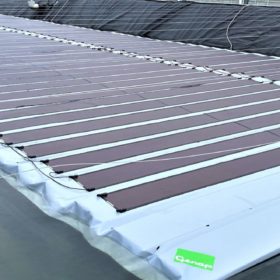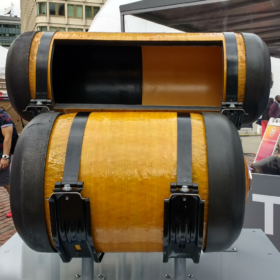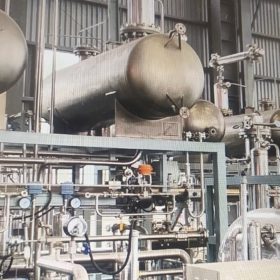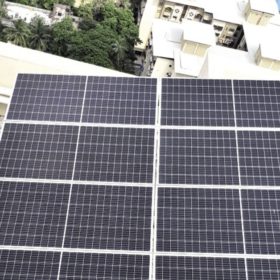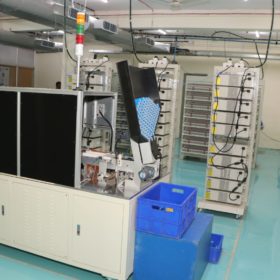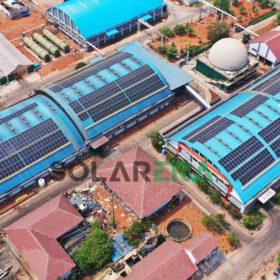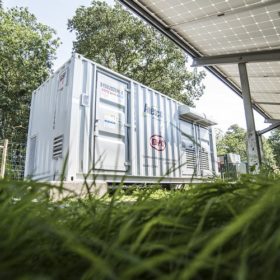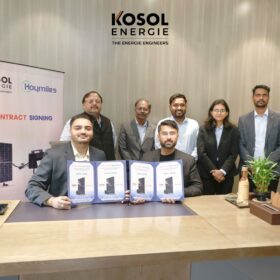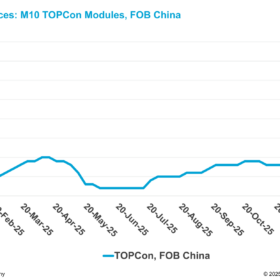Durgapur Projects tenders 20MW solar EPC at its thermal power plant
The state-owned integrated power utility has invited bids to install and commission a cumulative 20MW of ground-mounted, grid-connected solar capacity at its thermal power plant in Durgapur, West Bengal. Bidding closes on May 14.
Reliance New Energy appoints COO for silicon crystal and wafering
Reliance New Energy, the new energy arm of Reliance Industries Ltd, has appointed former SunEdison president Hak Do Yoo as chief operating officer for silicon crystal and wafering.
Lightweight solar for agricultural water reservoirs
The Genap Energy Cover uses HyET Solar Powerfoil thin-film solar modules, rated at 12.0% efficiency, for agricultural water storage and reservoirs, with an initial focus on the greenhouse and horticulture markets in the Netherlands. Genap said a 12kWp test setup had a generation density of 60W/m2, rising to 120W/m2 within a year, with an eventual target of 165W/m2.
UK government warns of global warming risks related to hydrogen leaks
The UK Department for Business, Energy and Industrial Strategy has published new research showing that hydrogen leaks could have an indirect climate-warming impact, partly offsetting efforts to reduce carbon dioxide emissions.
Greenko partners Belgium’s John Cockerill to build India’s largest hydrogen electrolyser factory
Indian renewable energy developer Greenko Group has partnered with Belgium’s John Cockerill to develop a green hydrogen electrolyzer factory with a capacity of 2GW per annum. The partnership will also see the two companies jointly develop large-scale green hydrogen projects in India.
India may miss 2022 solar target of 100GW by 27%
A new report by JMK Research and the Institute for Energy Economics and Financial Analysis (IEEFA) says India is likely to miss its ‘100GW by 2022’ solar target by about 27GW, mainly due to the underwhelming growth of rooftop solar. While utility-scale solar is on track to achieve nearly 97% of the 60GW installed capacity targeted by 2022, rooftop solar will be 25GW short of the 40GW mark.
ITP Group opens 100MWh lithium battery factory
Based in Gurugram, the plant will produce customized lithium battery packs for electric vehicles and stationary energy storage applications, including solar. The production capacity will be scaled up to 200MWh/annum by December end.
Pure solid state batteries from Switzerland
Swiss Clean Battery is set to start commercial production of its pure solid state batteries in Switzerland. The batteries are based on a protected electrolyte made of a solid ion conductor, which helps to maintain internal resistance and capacity. The fixed ion conductor is formed in the battery cell itself, similar to a multi-component adhesive.
E-waste consultancy gets a rooftop solar plant
Pune-based SolarEra Green Renewables has installed a 500kWp rooftop solar plant for Hindustan Waste Treatment. The plant uses 912 numbers of 550Wp mono PERC half-cut modules from Trina Solar.
APAC to lead global battery storage market, clock 68% share by 2026
The global battery energy storage market will grow to $10.84 billion in 2026, with around two-thirds of the demand concentrated in the Asia Pacific region.


